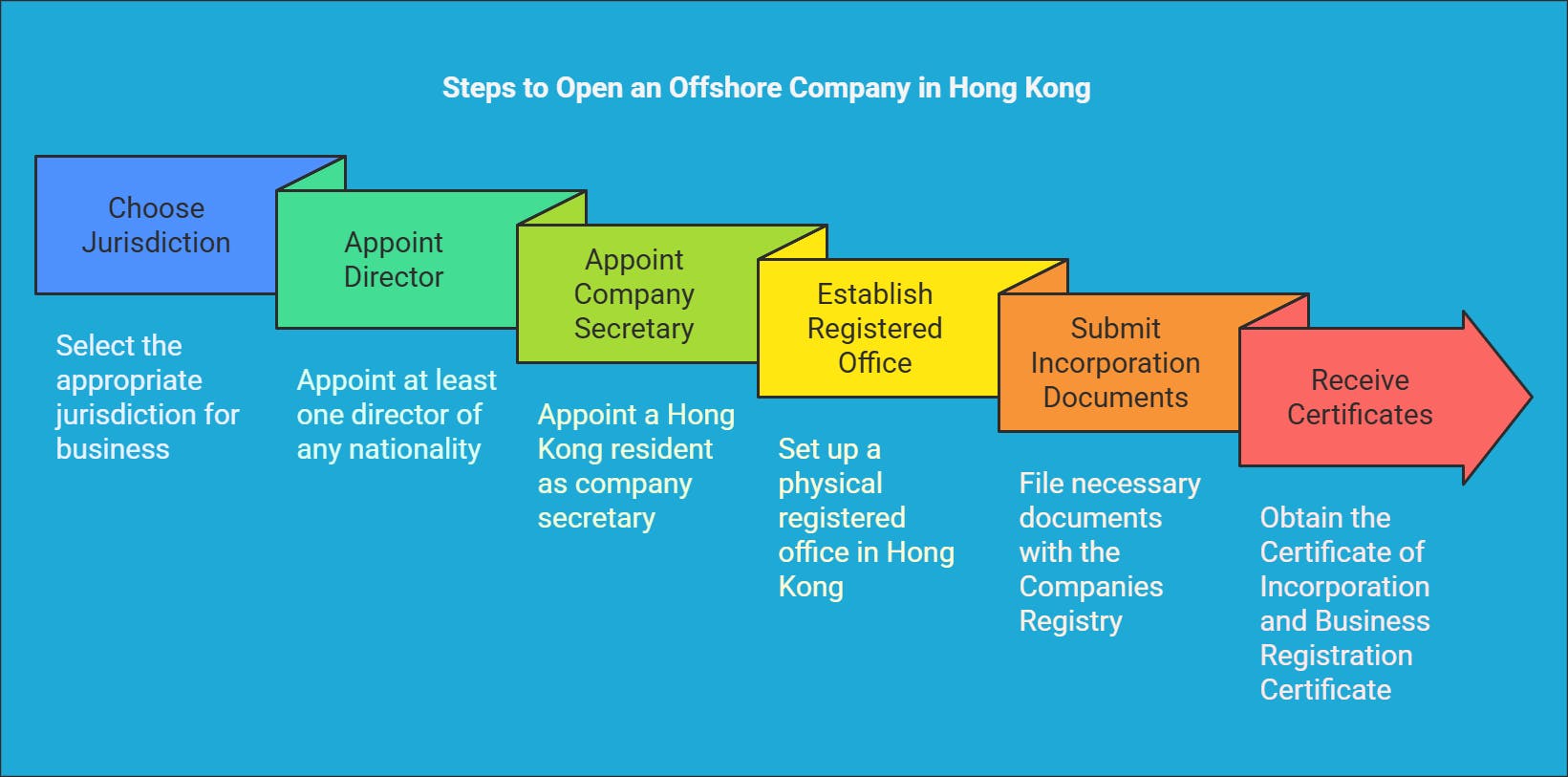What Is an Offshore Company?
An offshore company is a company that is incorporated in a country other than the country where its shareholders reside, usually in a low tax jurisdiction. Offshore companies, also known as international business companies, typically conduct business operations and other transactions in countries other than where they were incorporated.
Is it Legal to Have an Offshore Company?
People often assume that offshore companies are illegal as there's a common misconception that such companies are mainly used for illegal activities, money laundering, tax evasion, and unfair business practices.
However, offshore companies are totally legal.
There are no restrictions or limitations on the locations in which a person can set up a company. All that is required is total compliance with the legal requirements for registering the company and conducting business in that country.
Why Open an Offshore Company?
Offshore companies offer major benefits to individuals, companies, and even the countries involved.
Favorable Regulations
As an entrepreneur, the regulatory environment is a key consideration for setting up your business in any country. Living or conducting business in a country with unfavorable regulations for your business can be tiring. It can hinder your business growth and reduce your bottom line.
Lower Tax Burden
A lower tax burden has to count as the most popular benefit of opening an offshore company. Countries that attract many offshore companies mostly offer lower tax rates or have tax laws that promote lower tax obligations on companies and individuals.
No Foreign Exchange Control
Offshore companies are usually registered in countries that do not have a foreign exchange control system. In practice, this means that the company can make payments to or receive payments from multiple jurisdictions without administrative delays.
Access to Better Banking Infrastructure
Popular offshore destinations are known to provide higher bank interest rates and specialized banking services to individuals and companies.
Some offshore destinations are home to Fortune 500 Banks and some of the best digital banks and banking transactions. Offshore destinations are also often free from political and economic instability which may affect the county's banking sector.
Investment-Friendly Policies
Not all countries' policies encourage foreign investment. This can be problematic for large corporations seeking to expand to different parts of the world and individuals looking for legal means to protect their assets.
What Can an Offshore Corporation Be Used For?
Offshore corporations serve a range of purposes, making them valuable for individuals and businesses. They help optimize taxes by operating in jurisdictions with low or no tax rates, reducing financial burdens.
Asset protection is another key benefit, allowing companies to hold real estate, intellectual property, and investments while shielding them from legal claims and creditors. For international trade, offshore companies simplify cross-border transactions and lower import and export costs.
They also support estate planning by enabling the transfer of wealth to future generations while minimizing estate taxes. Confidentiality is a major advantage, as some jurisdictions do not require public disclosure of ownership.
Offshore companies are also commonly used for investment holding, managing stocks, bonds, and other financial assets with potential tax benefits. In e-commerce, they allow businesses to operate globally with fewer regulatory hurdles, making international expansion more efficient.
Offshore Companies Pros
Here are the advantages of offshore company formation:
| Advantage | Description |
|---|---|
| Tax-Free Income | Offshore companies operate outside their owners' country and are not subject to local taxation. Profits go directly to shareholders without being taxed in the country where the company is registered (taxes may still apply in the country of residence). |
| Low Cost | Setting up an offshore company is more cost-effective than maintaining traditional bank accounts, which often require high minimum balances. Some jurisdictions allow tax-free earnings, making it an attractive option. |
| Privacy | Company records are securely stored off-site, beyond the reach of the IRS, ensuring confidentiality and minimizing direct associations with the owner. |
| Asset Protection | Owners retain full control over the company’s assets, and personal assets remain protected in case of legal or financial disputes. |
| Ownership Flexibility | The ownership structure can be changed at any time. Shares can be sold after a set period, offering financial flexibility. |
| Limited Liability | Offshore structures protect owners from personal liability for company debts, keeping personal and business finances separate. |
| Business Opportunities | Offshore companies benefit from reduced regulatory burdens, international operational flexibility, asset protection, financial privacy, and simplified global transactions. |
Offshore Company Cons
However, keep in mind that offshore companies come with some disadvantages too. Generally speaking, the Cons will differ in a case-by-case situation.
| Disadvantage | Description |
|---|---|
| Complexity | Establishing an offshore company involves multiple steps, including legal registration, compliance checks, and extensive paperwork, making the process more complicated than setting up a domestic business. |
| Compliance Costs | Ongoing expenses, such as government filing fees, accounting and auditing fees, and administrative costs, add to the financial burden of maintaining an offshore company. |
| Reporting Requirements | Offshore businesses must file regulatory reports with local governments and financial institutions. Non-compliance can result in fines, penalties, or even legal consequences. |
Where to Open an Offshore Company
You can open a company in any country in the world but not all countries are ideal for setting up offshore companies.
For several reasons, some countries are the classic offshore jurisdictions and the go-to destinations for incorporating offshore companies.
How to Open an Offshore Company in Hong Kong
Starting an offshore company in Hong Kong involves several key steps to ensure legal compliance and smooth operations.
- Choose the right jurisdiction for your business. Each jurisdiction offers different benefits to your company.
- Appoint at least one director, who can be of any nationality and does not need to reside in Hong Kong. At least one director must be a natural person.
- A company secretary is mandatory and must be a Hong Kong resident or a registered corporate body based in Hong Kong. The company secretary ensures compliance with statutory obligations.
- Your company must have a physical registered office in Hong Kong, not a P.O. Box, to receive official documents.
- Prepare and submit the necessary incorporation documents, including the Articles of Association and information on directors, shareholders, and the registered office, to the Hong Kong Companies Registry. This can be done electronically or physically.
- Once the application is approved, you will receive a Certificate of Incorporation and a Business Registration Certificate from the Inland Revenue Department (IRD).
- Open a corporate bank account. If you want to expand your business internationally, you may need to open an offshore bank account.
- File the necessary paperwork with the Companies Registry, such as annual returns.
- Once registered, apply for offshore profits tax exemption by demonstrating that all business activities and income generation occur outside Hong Kong. You will need to provide audited documents.
Non-residents can serve as directors and shareholders, and the minimum share capital is HKD 1. To qualify for offshore tax exemption, businesses must provide evidence to the Inland Revenue Department (IRD) after registration, demonstrating that all operations are conducted outside Hong Kong.

Documents Included in All Offshore Company Incorporations
When incorporating an offshore company, the following documents are typically required:
- Certificate of Incorporation: This document confirms the legal existence of the company.
- Articles of Association: These outline the company’s internal rules and regulations.
- Memorandum of Association: This document defines the company’s objectives and scope of business.
- Share Certificates: These certify ownership of shares in the company.
- Register of Directors and Shareholders: This document lists the company’s directors and shareholders.
- Registered Office Address: Proof of a registered office address in the jurisdiction is required.
Conclusion
An offshore company allows you to receive benefits like privacy, confidentiality, asset protection, and ownership diversification without being subject to taxation or financial disclosure. The trade-off is that offshore companies incur fees, costs, and other cons.
However, if you plan to incorporate offshore, then you should know about the pros and cons of incorporating offshore. Every location and jurisdiction is different, and it's difficult to know the true efficacy of an offshore company for your business.
Hong Kong is one of the most popular offshore jurisdictions for a lot of companies. If you're interested in weighing Hong Kong as an option, contact us for more information and one of our experts will walk you through Hong Kong as an offshore incorporation option.





